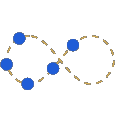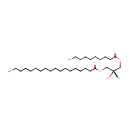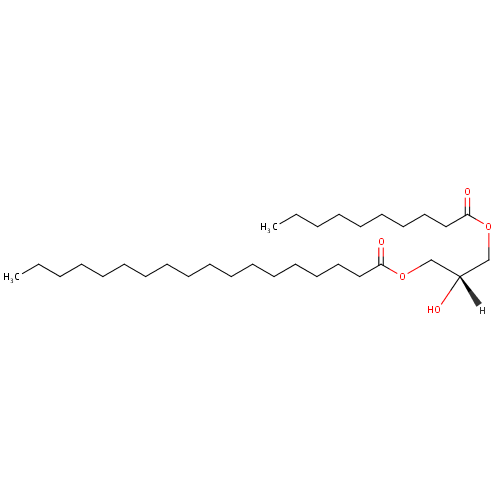|
Record Information |
|---|
| Version |
1.0 |
|---|
| Update Date |
1/22/2018 11:54:54 AM |
|---|
|
Metabolite ID | PAMDB003637 |
|---|
|
Identification |
|---|
| Name: |
DG(10:0/18:0/0:0) |
|---|
| Description: | DG(10:0/18:0/0:0) belongs to the family of Diacylglycerols. These are glycerolipids lipids containing a common glycerol backbone to which at least one fatty acyl group is esterified. DG(10:0/18:0/0:0) is also a substrate of diacylglycerol kinase. It is involved in the phospholipid metabolic pathway. |
|---|
|
Structure |
|
|---|
| Synonyms: | - 1-decanoyl-2-octadecanoyl-sn-glycerol
- 1-decanoyl-2-stearoyl-sn-glycerol
- DAG(10:0/18:0)
- DAG(28:0)
- DG(10:0/18:0)
- DG(28:0)
- Diacylglycerol
- Diacylglycerol(10:0/18:0)
- Diacylglycerol(28:0)
- Diglyceride
|
|---|
|
Chemical Formula: |
C31H60O5 |
|---|
| Average Molecular Weight: |
512.816 |
|---|
| Monoisotopic Molecular
Weight: |
512.444075032 |
|---|
| InChI Key: |
SNTBWBRHDLOYGC-LJAQVGFWSA-N |
|---|
| InChI: | InChI=1S/C31H60O5/c1-3-5-7-9-11-12-13-14-15-16-17-18-20-22-24-26-31(34)36-28-29(32)27-35-30(33)25-23-21-19-10-8-6-4-2/h29,32H,3-28H2,1-2H3/t29-/m0/s1 |
|---|
| CAS
number: |
Not Available |
|---|
| IUPAC Name: | (2S)-3-(decanoyloxy)-2-hydroxypropyl octadecanoate |
|---|
|
Traditional IUPAC Name: |
(2S)-3-(decanoyloxy)-2-hydroxypropyl octadecanoate |
|---|
| SMILES: | [H][C@](O)(COC(=O)CCCCCCCCC)COC(=O)CCCCCCCCCCCCCCCCC |
|---|
|
Chemical Taxonomy |
|---|
|
Taxonomy Description | This compound belongs to the class of organic compounds known as 1,3-diacylglycerols. These are diacylglycerols containing a glycerol acylated at positions 1 and 3. |
|---|
|
Kingdom |
Organic compounds |
|---|
| Super Class | Lipids and lipid-like molecules |
|---|
|
Class |
Glycerolipids |
|---|
| Sub Class | Diradylglycerols |
|---|
|
Direct Parent |
1,3-diacylglycerols |
|---|
| Alternative Parents |
|
|---|
| Substituents |
- 1,3-acyl-sn-glycerol
- Fatty acid ester
- Fatty acyl
- Dicarboxylic acid or derivatives
- Secondary alcohol
- Carboxylic acid ester
- Carboxylic acid derivative
- Organic oxygen compound
- Organic oxide
- Hydrocarbon derivative
- Organooxygen compound
- Carbonyl group
- Alcohol
- Aliphatic acyclic compound
|
|---|
| Molecular Framework |
Aliphatic acyclic compounds |
|---|
| External Descriptors |
Not Available |
|---|
|
Physical Properties |
|---|
| State: |
Not Available |
|---|
| Charge: | 0 |
|---|
|
Melting point: |
Not Available |
|---|
| Experimental Properties: |
|
|---|
| Predicted Properties |
|
|---|
|
Biological Properties |
|---|
| Cellular Locations: |
Membrane |
|---|
| Reactions: | |
|---|
|
Pathways: |
Not Available |
|---|
|
Spectra |
|---|
| Spectra: |
|
|---|
|
References |
|---|
| References: |
- Yurtsever D. (2007). Fatty acid methyl ester profiling of Enterococcus and Esherichia coli for microbial source tracking. M.sc. Thesis. Villanova University: U.S.A
|
|---|
| Synthesis Reference: |
Not Available |
|---|
| Material Safety Data Sheet (MSDS) |
Not Available |
|---|
|
Links |
|---|
| External Links: |
| Resource | Link |
|---|
| CHEBI ID | Not Available | | HMDB ID | Not Available | | Pubchem Compound ID | Not Available | | Kegg ID | Not Available | | ChemSpider ID | Not Available | | Wikipedia ID | Not Available | | BioCyc ID | Not Available |
|
|---|


